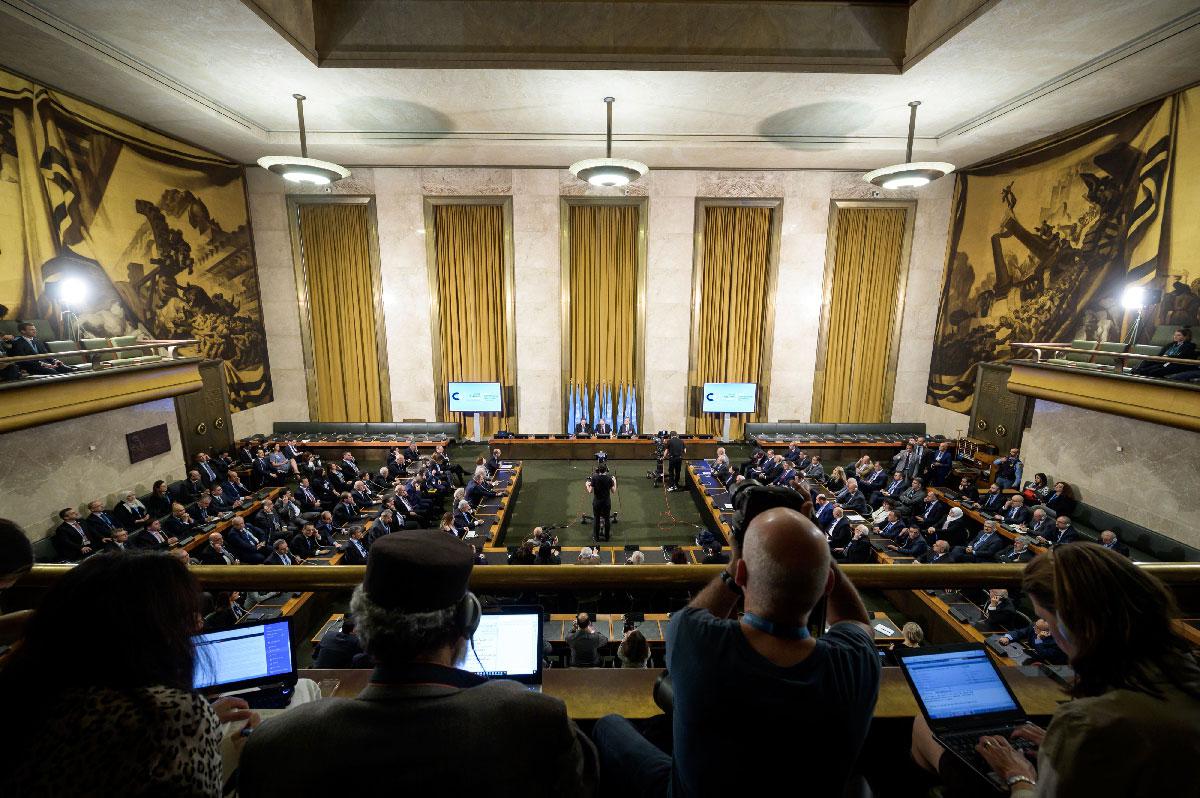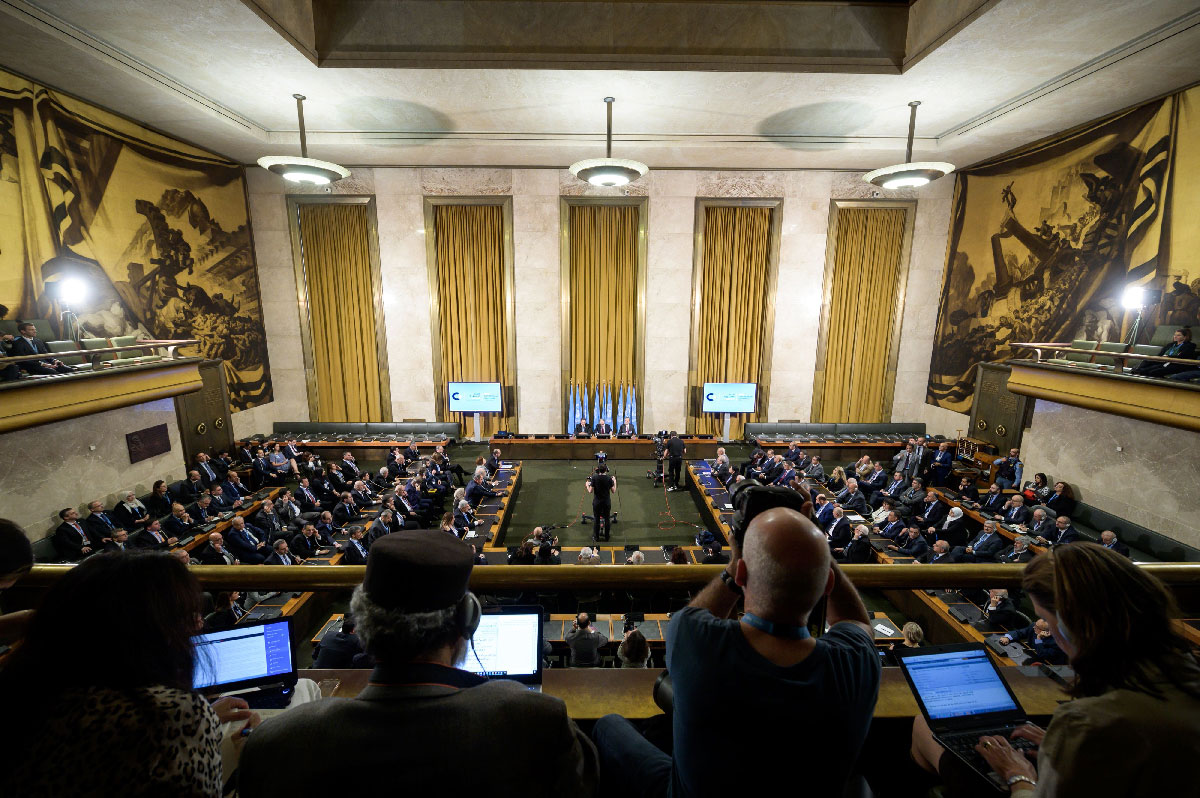Assad has little to lose at Russia-backed UN talks
GENEVA - Syria's government may be on board for the UN-brokered review of its constitution, but it will sink the Geneva talks that opened Wednesday before agreeing to anything that compromises its authority.
Opposition negotiators and some analysts also fear that Damascus will use its participation as a bargaining chip to normalise relations with the West, and eventually get sanctions lifted.
UN envoy for Syria Geir Pedersen welcomed as a "sign of hope" the creation of the committee tasked with amending the constitution for a nation battered by eight years of war.
UN Secretary General Antonio Guterres agreed. The committee would be taking "the first step on the political path out of the tragedy of the Syrian conflict", he said in a statement.
Syrian President Bashar al-Assad's main ally, Russia, first proposed a 150-strong committee last year at a meeting in the Russian city of Sochi. The move was interpreted as an attempt to form an alternative track to the negotiations sponsored by the UN.
The current 150-member constitutional committee has 50 Syrian government delegates, 50 members of the Syrian opposition backed by Turkey and Saudi Arabia, and 50 civilian representatives.
Although there are Kurds in all three delegations, representatives of the Kurdish administration in northeast Syria have been excluded from the committee, largely due to opposition from Turkey. Turkey views those Kurdish forces as an extension of the PKK, a Kurdish militant group that has waged a deadly insurgency inside Turkey for decades.
Kurdish forces in the northeast of Syria have been forced to open Russia-brokered talks to reach a deal with the Assad government, following the dramatic withdrawal of American troops from the region by US President Donald Trump, which paved the way for a Turkish incursion against Kurdish forces near the Syria-Turkey border.
The rapprochement with the Kurds has allowed the Syrian regime to enter territory that had been out of its control for much of the war. Some experts argue that the Geneva talks will merely offer an opportunity for Assad's government to appear open to UN-backed diplomacy without giving anything away.
Assad "has nothing to lose," at the talks, Aaron Lund of the Century Foundation said. "If the process turns unpleasant for some reason, it's no big deal. He'll just make up some technical reason to stall it."
'New' constitution?
In opening remarks at the talks' opening ceremony, Ahmad Kuzbari, the committee's government co-chair, hit out at "terrorism" and hailed "the sacrifices and heroic deeds" of our army.
He added: "The occupation of our territory, the spoilation of our resources, the continuing imposing of unilateral sanctions threaten the entire political process as well as being in contradiction with international legitimacy".
Opposition co-chair Hadi al-Bahra said 65 percent of Syria had been damaged, adding: "It is time for us to believe victory in Syria is achieving justice and peace not winning the war."
Government and opposition delegations sat stony-faced opposite each other in the gilded hall at the UN European headquarters in Geneva, and the co-chairs did not shake hands at the end of the 45-minute ceremony.
After the opening ceremony, a sub-group of 45 delegates will begin working with the aim of drafting an entirely new constitution or revising the one adopted in 2012 as a response to the Syrian uprising.
Pedersen said the aim would be to reach consensus on all issues.
Where that was not possible, changes would only be made with a 75-percent majority vote in the committee to avoid having any one side dictate the process - but that stipulation will likely lead to paralysis as the prospects of consensus appear remote.
Opposition delegates, meanwhile, have already complained that the committee's remit represents an abandonment of vital agreements made in prior UN resolutions, including for the release of political detainees.
But with the recent power shifts in Syria, there is ever greater pressure on opposition negotiators to acknowledge their weakened position and scale back their demands.
While the opposition has called for an entirely new text, Syrian Foreign Minister Walid Muallem argued that amending even one article of the current charter would amount to a "new constitution". Damascus has also insisted that the process have no deadline.
The Assad government may agree to a few amendments, International Crisis Group senior analyst Sam Heller said - but a "completely rewritten" constitution appeared impossible. Damascus only agreed to join the Geneva meeting at the urging of its Russian allies, he argued.
'Dirty little deals'
While Moscow pursued Syrian diplomacy outside of the UN-umbrella, it always maintained that a solution to the conflict had to earn the UN stamp of approval.
Previous talks in Geneva had fallen apart on Moscow's reluctance to press the Assad government to engage constructively with opposition negotiators. The Kremlin is now looking to press the advantage of its gains as the main power-broker in Syria, following the withdrawal of American troops from the strategic northwest region.
Constitutional review is a central part of the UN-led effort to end the war in Syria, which has killed more than 370,000 people and forced millions to flee their homes since 2011.
Security Council resolution 2254, which defines the UN push for peace, also calls for UN-supervised elections in Syria.
While Assad's forces have steadily made gains against the opposition, his cash-strapped government is still hit by EU and US sanctions. It desperately needs funds to rebuild the war-ravaged country.
Russia has repeatedly called for the international community to unlock Syrian redevelopment funds.
Opposition negotiators warned last month that Assad could use its participation at the constitutional review as a "card" to press its case for financial aid.
"If it turns out there's an opportunity to use this forum to unlock new opportunities and normalise ties with the international community, (Assad) will do that," Lund said.
"What the constitutional committee can do, at best, is to put a gloss of international legitimacy on whatever dirty little deals may be hashed out behind the scenes."
"It is just the beginning of a very difficult process which is going to be extremely challenging to manage," Iran's foreign minister Mohammad Javad Zarif told a news conference on Tuesday night after meeting his counterparts Turkey's Mevlut Cavusoglu and Russia's Sergei Lavrov in the Swiss city.
"It must be Syrian-owned and Syrian-led, it must be viable and seen as such by the Syrian people," he said.
Turkey, which supports Syrian rebels, joined Iran and Russia, the main backers of Assad, in claiming credit for the initiative.



